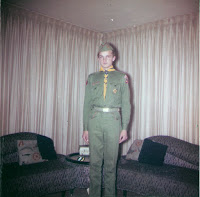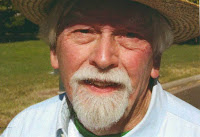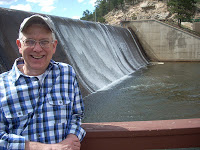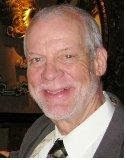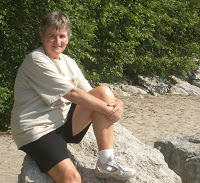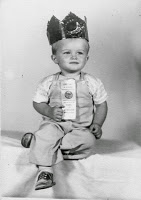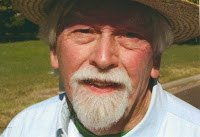Fault,
with it’s many meanings, is not a positive word. It’s not my fault! It’s all
your fault, or The Government’s fault, or my teacher’s fault. Electrical faults
can cause plane crashes, brownouts and blackouts. The cry of fault on
the tennis court means failure; a missing of the mark. We find fault with other
people, and occasionally admit to our own. We fault others for their errors and
disclaim responsibilities by proclaiming not to be at fault. And these days we
even must have no-fault car insurance. But there are of course the biggest, baddest
faults, those gashes in the bedrock which suddenly, or sometimes not so
suddenly, jerk into violent movement causing earthquakes and occasionally
tsunamis, and the deaths of many hundreds of thousands of people.
with it’s many meanings, is not a positive word. It’s not my fault! It’s all
your fault, or The Government’s fault, or my teacher’s fault. Electrical faults
can cause plane crashes, brownouts and blackouts. The cry of fault on
the tennis court means failure; a missing of the mark. We find fault with other
people, and occasionally admit to our own. We fault others for their errors and
disclaim responsibilities by proclaiming not to be at fault. And these days we
even must have no-fault car insurance. But there are of course the biggest, baddest
faults, those gashes in the bedrock which suddenly, or sometimes not so
suddenly, jerk into violent movement causing earthquakes and occasionally
tsunamis, and the deaths of many hundreds of thousands of people.
I have a major
fault in me. Within me. Ok Ok, I’ve got lots of them, I’m full of failings and
faults, but I’m talking of a geologic type of fissure; my very being torn
asunder. At a very young age, I couldn’t say when, social pressure started to
build up stress on the fault line between a straight me and a gay me – my
Straight Shale and my Lesbian Limestone. The building stresses finally caused
the fault to give way, allowing the Straight Shale to be forced up and over
that Lesbian Limestone. It got buried. It disappeared. But of course it was
still there, as are all things invisible beneath the surface of the earth or of
our psyches.
fault in me. Within me. Ok Ok, I’ve got lots of them, I’m full of failings and
faults, but I’m talking of a geologic type of fissure; my very being torn
asunder. At a very young age, I couldn’t say when, social pressure started to
build up stress on the fault line between a straight me and a gay me – my
Straight Shale and my Lesbian Limestone. The building stresses finally caused
the fault to give way, allowing the Straight Shale to be forced up and over
that Lesbian Limestone. It got buried. It disappeared. But of course it was
still there, as are all things invisible beneath the surface of the earth or of
our psyches.
Shale is not a good
foundation rock. It cracks and breaks and splits and crumbles. It slips and slides.
With these qualities, it tends to weather and erode away quite rapidly. And my
Straight Shale layer was pretty thin to begin with! After forty years or so –
happily it was eroding at human speed not that creep of geologic time – it was
all but gone.
foundation rock. It cracks and breaks and splits and crumbles. It slips and slides.
With these qualities, it tends to weather and erode away quite rapidly. And my
Straight Shale layer was pretty thin to begin with! After forty years or so –
happily it was eroding at human speed not that creep of geologic time – it was
all but gone.
The fault line was
exposed at the surface. And on the other side of it, a mere step away, lay a
vast stretch of Lesbian limestone, glittering in the sunshine. I pulled my feet
free of that cloying clinging Straight Shale mud and stepped across the fault
onto that wide open, welcoming, slab of Lesbian Limestone. Only I prefer to
think of that line as a no-fault line. It’s not my fault, it’s not my parents’
fault and it’s not a fault at all.
exposed at the surface. And on the other side of it, a mere step away, lay a
vast stretch of Lesbian limestone, glittering in the sunshine. I pulled my feet
free of that cloying clinging Straight Shale mud and stepped across the fault
onto that wide open, welcoming, slab of Lesbian Limestone. Only I prefer to
think of that line as a no-fault line. It’s not my fault, it’s not my parents’
fault and it’s not a fault at all.
Crossing that line
is, to paraphrase Neil Armstrong, but a small, simple, step, for man or woman. But perhaps, just maybe, as endless numbers
of people continue to cross it, it will become, in terms of acceptance and
understanding, a giant leap for mankind.
is, to paraphrase Neil Armstrong, but a small, simple, step, for man or woman. But perhaps, just maybe, as endless numbers
of people continue to cross it, it will become, in terms of acceptance and
understanding, a giant leap for mankind.
© 20 Apr 2015
About the Author
I
was born and raised in England. After graduation from college there, I moved to
the U.S. and, having discovered Colorado, never left. I have lived in the
Denver-Boulder area since 1965, working for 30 years at IBM. I married, raised
four stepchildren, then got divorced after finally, in my forties, accepting
myself as a lesbian. I have now been with my wonderful partner Betsy for 28
years.
was born and raised in England. After graduation from college there, I moved to
the U.S. and, having discovered Colorado, never left. I have lived in the
Denver-Boulder area since 1965, working for 30 years at IBM. I married, raised
four stepchildren, then got divorced after finally, in my forties, accepting
myself as a lesbian. I have now been with my wonderful partner Betsy for 28
years.







